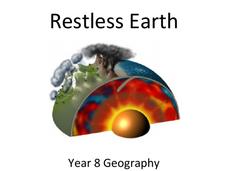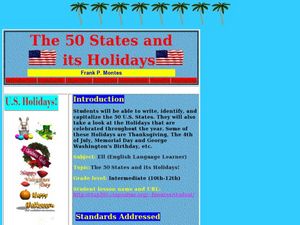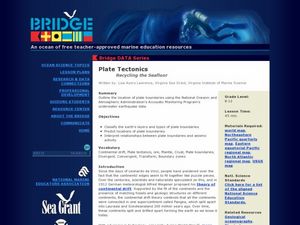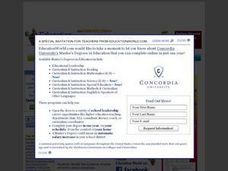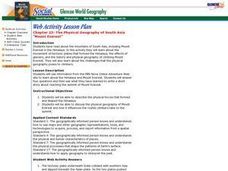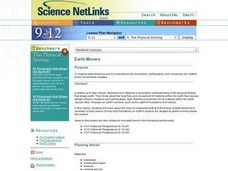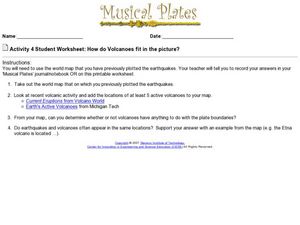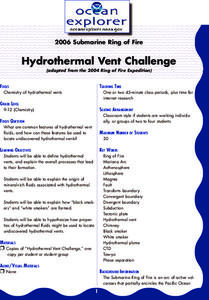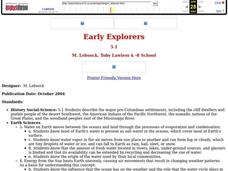National Geographic
Mapping the Americas
Celebrate the geography of the Americas and develop map skills through a series of activities focused on the Western Hemisphere. Learners study everything from earthquakes and volcanoes of the Americas and the relationship...
Curated OER
Peru's Earthquake
Students identify the patterns of earthquakes by mapping USGS data and comparing it to mapped tectonic plates. They discover the relationship between earthquakes and the moving plates of the Earth's crust.
Curated OER
Earth Forces
Students use geological techniques such as plate tectonics, mountain building, earthquakes, and volcanoes, in order to explain the earth.
Curated OER
Japan's Geography Worksheet
In this geography skills worksheet, students label a map of Japan and then respond to 8 short answer questions about the country.
Geographer Online
Restless Earth
In less than 25 years, the continent of Australia moved 4.9 feet thanks to plate tectonics. The presentation introduces the idea of the layers of the earth as well as plate tectonics. It goes into why the plates move and where we believe...
Curated OER
Ring of Fire
Students locate some of the 1,500 active volcanoes on a world map. Then by comparing their maps with a map of the world's tectonic plates, they discover that volcanoes occur because of the dynamic nature of the Earth's lithosphere.
Curated OER
Geography Tutor: Five Themes of Geography: DVD-Video Assignment
In this geography skills worksheet, learners watch the National Geographic video "Five Themes of Geography." Student then respond to 8 short answer questions about content of the video.
Curated OER
Shaky New Zealand
Students explore geography by answering study questions in class. In this plate tectonics lesson, students identify the earthquake data concerning the country of New Zealand and answer questions regarding the data. Students identify...
Curated OER
The 50 States and its Holidays
Though the format of this ELL lesson plan is confusing (the standards listed are for plate tectonics, yet the objectives are for American geography and holidays), a teacher could glean some ideas from the main idea. Here, pupils complete...
Curated OER
The Gifts of the Nile
Get your class thinking about the geography that shaped the Egyptian landscape and culture. They compare ancient climate zones and geogrpahical fetures, locate evidence of plate tectonics, take and quiz, and write a short essay. The...
Science Matters
Ring of Fire
Over a period of 35 years, earthquakes and volcanoes combined only accounted for 1.5 percent of the deaths from natural disasters in the United States. The 15th lesson plan in a 20-part series connects the locations of earthquakes...
Science Matters
Seismic Activity and California Landforms
By the 19th lesson in the 20-part series, scholars realize volcanoes and earthquakes are related to plate boundaries. The lesson extends and applies the knowledge by having individuals create a bumper sticker for one specific area of...
Curated OER
Plate Tectonics: Recycling the Seafloor
Students classify earth's layers and plates using Ocean Seismicity data. In this plate tectonics instructional activity, students outline where the plate boundaries are on the world map. They then compare these predicted boundaries with...
Curated OER
Where in the World Is That Volcano?
Identify the Earth's major volcanoes with an earth science lesson. Elementary and middle schoolers locate major volcanoes on a world map. Then, in groups, they research how the volcano affects the region in which it is located.
Curated OER
The Physical Geography of South Asia
Students describe the physical forces that formed and shaped the Himalaya, then discuss the physical geography of Mount Everest and how it influences the routes climbers take to the summit.
Curated OER
Earth Movers
Students read an online article about an earthquake and follow up with a series of discussion questions about earthquakes. They answer questions in their science journals about continental drift, plate tetonics, and their influence on...
Curated OER
How do Volcanoes Fit in the Picture?
In this volcanoes worksheet, students look at maps and answer short answer questions about volcanoes, plate boundaries, and earthquakes. Students complete 4 questions.
Curated OER
Get the Drift?
The anticipatory set is clever: give groups five minutes to work on the puzzle and then discuss what strategies they used to match the few that connected. This introduces middle schoolers to the concept of continental drift. A portion of...
Curated OER
Hydrothermal Vent Challenge
Give our ocean voyagers the "Hydrothermal Vent Challenge!" It is a worksheet that guides them through an exploration of hydrothermal vents and the chemical reactions that occur when lava meets seawater. Using a collection of websites,...
NOAA
Into the Deep
Take young scientists into the depths of the world's ocean with the second lesson of this three-part earth science series. After first drawing pictures representing how they imagine the bottom of the ocean to appear, students...
Curated OER
Volcano Live
Students discover the inevitable threat of volcanoes as they identify the ring of fire. In this natural disasters instructional activity, students examine the tectonic plate theory and discuss how magma works it's way to the surface of...
NOAA
Water Cycle
Be water wise! Science scholars learn the water cycle on a global scale in part seven of a 13-installment series. The hands-on interactive allows them to explore Earth's water storage, types of precipitation, and the cycling of water...
Curated OER
Are We Falling Apart? Exploding Volcanoes
Young scholars research and demonstrate volcanic activity. In this volcanism lesson plan, students research the types of volcanoes and define related terms using the Internet. They demonstrate volcanic activity with water, corn syrup,...
Curated OER
Early Explorers
Fifth graders study early explorers. In this World history lesson plan, 5th graders draw an outline of a map labeling each part, build geographical features out of dough, and paint each of the land and water features.






